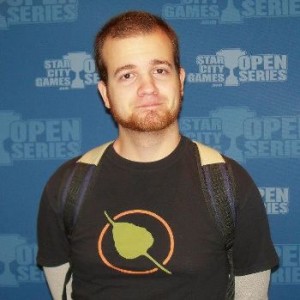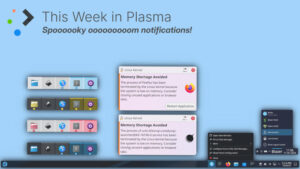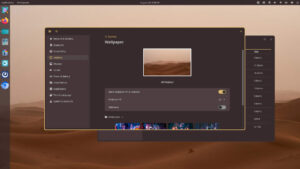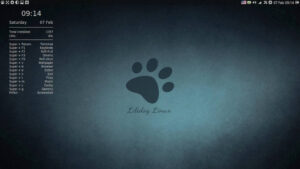The FOSS Force Interview
Jeff Hoogland comes by the respect he has within the Linux community the old fashioned way; he’s earned it. He’s done so, in large part, by creating the Bodhi Linux distro, which is not only very popular with a large and loyal user base, it’s rock solid, stable and even elegant. It’s also not a “cookie cutter distro” by any stretch of the imagination — there’s nothing else like it on the DistroWatch’s list. He also likes to share his ideas with the community, which he does through his blog, Thoughts on Technology.

In his free time, he’s a gamer. Oddly, his game of choice isn’t played with a joystick hooked-up to a computer, but something a little more retro — the 1990s fantasy trading card game Magic: The Gathering. Evidently, he’s quite good at it.
Oh yes, he’s also a family man, but more on that later…
It’s been exactly four months since Hoogland steped down as lead developer for Bodhi Linux, a move that naturally caused some concern among the distro’s users. Wondering myself about the future of Bodhi and Hoogland’s personnel plans, last week I sent him a message, asking if he’d be interested in doing an email interview with FOSS Force, which he quickly agreed to do. Not wanting to take too much of his time, I kept the interview short, at only a dozen questions.
I think enough has been written about your motivations for leaving Bodhi that we don’t need to rehash that, unless you have something to add. However, I’d like to say I’m not sure that your resignation came as a complete surprise — at least it didn’t to me. From what I’d read on your blogs, I had the impression that your dream wasn’t to be a lifelong maintainer of a Linux distro. Was that a fair assumption?
That is correct. I started Bodhi during my last year of undergrad school as a way to save time. At that point, I was compiling the Enlightenment desktop and other software updates on six plus computers, multiple times per-month, and that did not make sense to me. So I put up my own repository and spun up a custom disc. It needed a name, so Bodhi was born. Turns out a good deal of other people liked what I was doing and the project got popular.
I thought I saw somewhere in the days following your resignation that people had been found to continue the development of Bodhi. However, today when I looked around online, I couldn’t find any evidence of this. The project’s website, which doesn’t appear to have been updated recently, still lists you as the project manager and lead developer. What’s the current status of Bodhi Linux? Will we see future releases, or do you know?
 You can find my post about Bodhi changing hands from back in September here and it still remains true –- the project is still being worked on. The delay is a combination of my own previous organization (or lack thereof) and getting the new folks set-up. The build process for Bodhi was largely handled by myself previously and much of my process was contained in my head and not in documentation. That is changing.
You can find my post about Bodhi changing hands from back in September here and it still remains true –- the project is still being worked on. The delay is a combination of my own previous organization (or lack thereof) and getting the new folks set-up. The build process for Bodhi was largely handled by myself previously and much of my process was contained in my head and not in documentation. That is changing.
You can find the build scripts for Bodhi’s Enlightenment packages on GitHub here. The team’s current goals are to have a new release candidate published by the end of January with a stable 3.0.0 release by the end of February.
Our previous webmaster has been mostly MIA, so the website has not been updated lately. With the holidays passing though, it isn’t uncommon for people to be busy with other things. Hopefully we can get better communication moving forward now that the new year is here.
Bodhi developed a loyal user base almost immediately after the first release. For a long while it was on DistroWatch’s top ten list, if I remember correctly. Why do you think it sparked such immediate interest and were you surprised by how quickly people began adopting it?
Bodhi filled a niche that was previously void in the world of Linux distros. To this day it is still one of the few distros shipping a functional Enlightenment desktop by default. On top of that, the minimalist approach our team always took was ideal for many. The open source world is full of people who want things their way –- not how someone else thinks is best. Bodhi allows them to easily do it.
Why was the decision made to base Bodhi on Ubuntu instead of another distro or even building from scratch?
Keeping things simple. Say what you will about a lot of thing things the Ubuntu team does, their base consistently has the best balance of stable to current software in my opinion. On top of that, Ubuntu often receives the most third party support from other vendors.
When I began reading about Bodhi I was very intrigued — enough so that I eventually used it as my distro of choice, even though I had no prior experience with Enlightenment. I also had no experience with Ubuntu and was, in fact, biased against it because of reservations about Canonical. However, as soon as I began using Bodhi I found myself developing a respect for Ubuntu, as I discovered that a lot of things just worked out of the box which had been problematic with other distros I’d used. Is this just my experience, or did other users come to Bodhi wary of the Ubuntu connection, then discover they liked what they found “under the hood?”
I think this is fairly common. Since we are one of the few Enlightenment based distros, people often “settle” for our Ubuntu base only to discover that it is very reasonable and makes things generally simple. Once you strip out all of the Unity nonsense, the Ubuntu core is quite wonderful.
Looking back, what do you consider to be the most important thing you learned from your experience with Bodhi?
Open source projects are best as a team effort. Never be afraid to ask for help. Even though I did the bulk of the development work for a long time with Bodhi, I had other people helping with art work, documentation, website and providing support. Even small projects should not be a one man team.
In a similar vein, what did you learn that surprised you?
Debian packages are insanely complicated. I have been producing them for years now and feel like I have barely scratched the surface of everything they are capable of.
I was always impressed by both the quality of help I received and the politeness I found on the Bodhi forums. Did that happen automatically, or did you have to work to maintain that?
I set a tone with my posts and others who stuck around emulated that. Telling new people to simply RTFM is not helpful if they cannot even find the manual. It is important to remember that everyone starts somewhere. At one point we where all a new user looking for some help.
What do you think have been Bodhi’s greatest contributions to GNU/Linux, either technically or otherwise?
Bug reports. Specifically for the Enlightenment desktop. It is not a stretch to say that Bodhi provides a good deal of Enlightenment users, which leads to a good deal of issues being uncovered. We do our best to report as many of them in as much detail as possible. Working closely with your upstream projects is important in the open source community. It helps keep the software moving forward for everyone.
One of the things you said you wanted to do after leaving Bodhi was to broaden your skills. At the time, you seemed to be quite enthused about Python. I notice that yesterday you posted a notice to your blog about “Weather Trek,” which looks to be an easy to use trip planning app you’ve written in Python. I take it that your appreciation of Python continues?
It does!
Besides Weather Trek, on what other projects are you working?
Weather Trek is the latest of a few different projects on which I have been working. You can find all of these various toys on my GitHub page here. With the Bodhi project, I focused on learning my way around the Elementary toolkit and since then I have expanded my horizons to become familiar with the Qt toolkit as well. In addition to Weather Trek, I have written a simple Pandora Radio player called qAndora and a statistics tool called Qute.
Where would you like to go from here? What direction would you like to see your life take?
In terms of technology, I want to continue developing my Python skills and building neat tools. I enjoy the problem solving that programming offers, along with all the new things it allows me to learn. I also intend to continue offering a guiding hand to the Bodhi project. The 3.0.0 release will be a big deal and I am excited to help the new developers get it out the door.
My life outside of open source has been very blessed. My wife and I recently purchased our first home, our eleven month old son is happy and healthy, and we are expecting our second child this summer.
Perhaps Hoogland’s most telling answer, on many different levels, came the day after the interview was completed. While preparing this article for publication, I had a facepalm moment when I realized I failed to ask what should have been an obvious question. So I apologetically emailed him back with one last question. “Where do you weigh in on the systemd brouhaha?” I asked. His answer? “Not nearly educated enough on the issue to make an informed assessment currently.”
I had to chuckle. Not being “nearly educated enough on the issue” certainly hasn’t stopped a host of others with far less experience from expressing systemd opinions — and expressing them loudly.
Christine Hall has been a journalist since 1971. In 2001, she began writing a weekly consumer computer column and started covering Linux and FOSS in 2002 after making the switch to GNU/Linux. Follow her on Twitter: @BrideOfLinux













Happy New Year to Jeff & Family. Wish that your happy life will continue for eternity.
Bodhi Linux is a little jewel. Many thanks to Jeff for creating and maintaining it for a long while, and many thanks to the current team for keeping it alive.
While I have never personally been fond of Enlightenment, I have been intrigued by Bohdi and Enlightenment to try them out. What I found gave me a great of respect for the distro and Enlightenment even if my personal preferences run towards other DEs.
Nice interview. Bodhi was one of my first distros and I’ve always held a fondness for it. Glad to hear things are going well for Jeff, and I hope Bodhi continues to thrive under the new maintainers!
Great to hear more about the wonderful Jeff and his family, Christine!
You are so right about that last thing. If Jeff feels the need for study before pronouncing on systemd, then so do most of us. A lesson in appropriate humility.
Long may Bodhi continue – it is simply excellent.
Thank you for that.